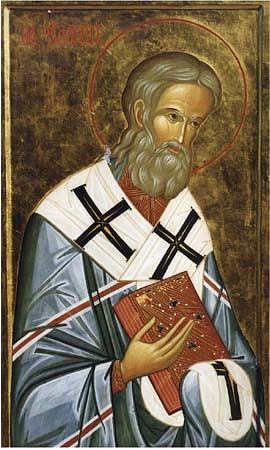
St. Philaret, metropolitan of Moscow (1867)
Commemorated on November 19
Born of a priestly family near Moscow in 1782, he entered
seminary at a young age and soon distinguished himself for his piety and his
scholarship of ancient languages. He was tonsured a monk, but was made a
professor at the seminary in Moscow, where his expositions of the Faith, spoken
and written, caused him to be regarded as a Father of the Church in his own
time; many called him "the new Chrysostom."
In 1817, at the age of thirty-five, he was consecrated bishop, and in only a
few years rose to the rank of Metropolitan of Moscow, the highest office in the
Russian Church since Peter the Great abolished the Patriarchate. He remained
Metropolitan for the rest of his life. Saint Philaret seemed literally tireless
in his labors for the Church: no-one knew when he slept, and his servant, no
matter when he came to the Metropolitan's quarters, would always find him
working at his desk. He worked to restore moral standards among the clergy,
which had fallen into laxity. Whenever he was forced to depose a cleric, he
would secretly contribute to the family's needs out of his own resources.
Similarly, he used up all of his financial resources in charitable works, always
taking care that his donations were kept secret. He funded the building of a
large hospice for orphans and children of poor clergy families.
St Philaret gave his full support to the fifty-year project of translating the
Bible into Russian, and translated several Old Testament books himself, though
the project was opposed by the Tsar and by some powerful groups in the Church.
He supported the work of the fathers of Optina Monastery to publish translations
of the Fathers of the Church; these translations, when they appeared,
contributed to a great spiritual awakening in Russia.
He reposed in peace in 1867 at the age of eighty-five.

The well-loved "Morning Prayer of Philaret of Moscow" which begins "Lord,
grant me to greet the coming day in peace..." was brought into Orthodox piety by
St Philaret but seems originally to have been written by Francois Fenelon, the
French Quietist writer. The prayer also came to be used by the Optina Elders and
is sometimes referred to as the "Morning Prayer of the Optina Elders." The
prayer appears in several similar versions.
O Lord, grant me to greet the coming day in peace. Help me
in all things to rely upon Your holy will. In every hour of the day reveal Your
will to me. Bless my dealings with all who surround me. Teach me to treat all
that comes to me throughout the day with peace of soul, and with the firm
conviction that Your will governs all. In all my deeds and words guide my
thoughts and feelings. In unforseen events let me not forget that all are sent
by You. Teach me to act firmly and wisely, without embittering or embarrassing
others. Give me strength to bear the fatigue of this coming day with all that it
will bring. Direct my will, teach me to pray, pray You Yourself in me. Amen.